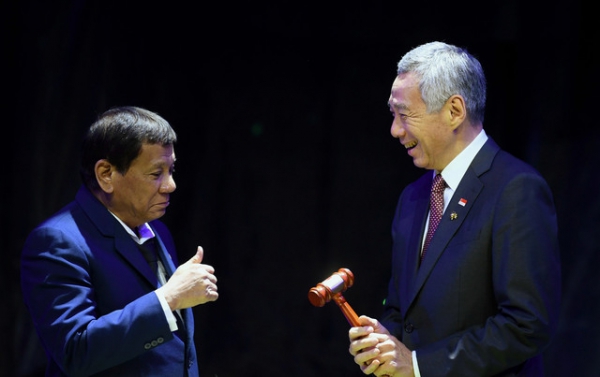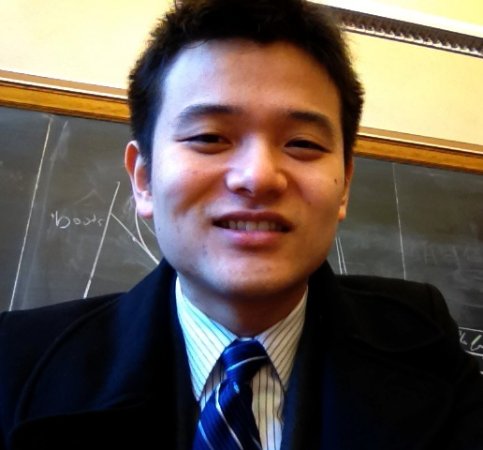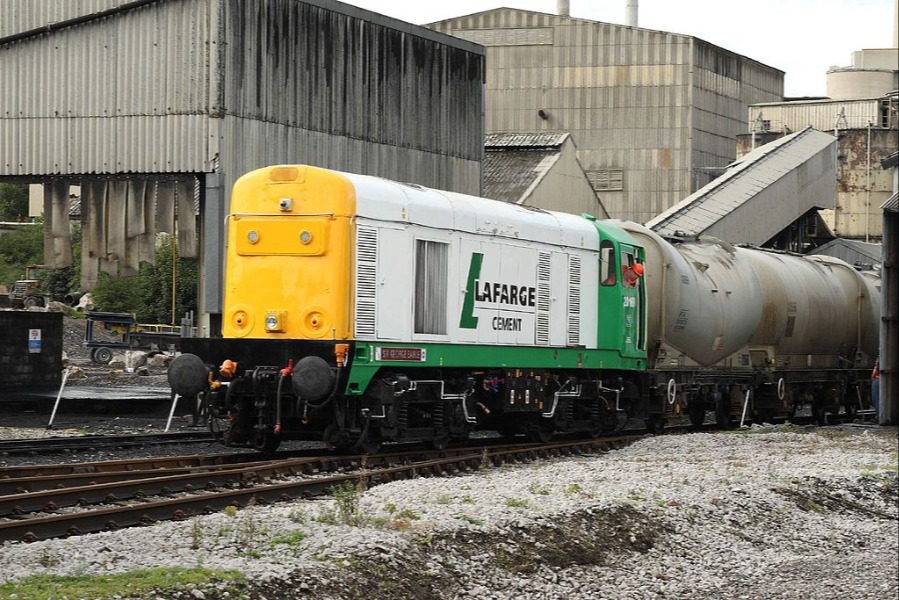Water Wars: ASEAN No Longer 'Concerned' About China’s Actions in the South China Sea
The semiannual Association of Southeast Asian Nations (ASEAN) Summit concluded last month with yet another reminder of China’s growing clout in Southeast Asia. For the first time since 2013, the ASEAN chairperson’s statement did not express ASEAN member states’ concerns about land reclamation in the South China Sea.

Published by The Lawfare Institute
in Cooperation With

The semiannual Association of Southeast Asian Nations (ASEAN) Summit concluded last month with yet another reminder of China’s growing clout in Southeast Asia. For the first time since 2013, the ASEAN chairperson’s statement did not express ASEAN member states’ concerns about land reclamation in the South China Sea. Rodrigo Duterte, the Philippine president and chairman of ASEAN, also failed to mention the July 2016 arbitration decision that invalidated China’s disputed maritime claims in the South China Sea in his released statement. The statement was released three days after the meeting among ASEAN leaders, stoking speculation that the parties had disagreed about the wording on contentious issues. There was no disagreement about the language of the statement from the Chinese Foreign Ministry, which praised the statement for reflecting the “real situation in the South China Sea, [where tensions are] cooling down and moving toward a stable and positive direction.”
The omissions of explicit language about land reclamation and the arbitration decision are consistent with Duterte’s foreign policy. Duterte has been consistently criticized in the Philippines for ignoring the arbitration results and failing to defend Philippine sovereignty. At the summit, Duterte focused on the announcement that China and ASEAN would begin negotiations on a Code of Conduct (COC) for the South China Sea in early 2018. At an ASEAN press conference, Duterte told reporters that Chinese authorities had promised to “fast-track” the negotiations. In fact, some commentators attribute the COC progress and the broader thaw in relations between ASEAN and China to Duterte’s more conciliatory approach to dealing with China. However, other experts are warning that the finalized COC is likely to contain vague language, without referring to specific parts of the sea or affirming the importance of freedom of navigation.
With the summit marking the end of Duterte’s tenure as chairman of ASEAN, the focus now shifts to Singaporean Prime Minister Lee Hsien Loong who will serve as the chairman of ASEAN in 2018. In his speech at the ASEAN summit, Lee assured the audience that he would focus on further economic integration between the ten member nations of ASEAN. As for the South China Sea, Lee told Singaporean reporters that “while the situation is calmer now, [ASEAN] cannot take the progress for granted.” Commentators have expressed optimism that with a nonclaimant party like Singapore at the helm, ASEAN should make further progress in its negotiations with China on COC negotiations. In fact, Singapore may be inclined to keep ASEAN on the course set by Duterte. Reuters reported earlier this year that China was already applying pressure behind the scenes on Singapore, urging it not to rock the boat on South China Sea issues once Singapore assumes the role of leading ASEAN.
In Other News…
Japan
According to Japanese news outlets, Japan and China have agreed to hold maritime talks later this month in Shanghai. The announcement came shortly after Japanese Prime Minister Shinzo Abe met with Chinese President Xi Jinping on the sidelines of the Asia-Pacific Economic Cooperation 2017 summit in Vietnam Nov. 11, and then with Chinese Premier Li Keqiang at the ASEAN meetings in the Philippines Nov. 13.
The meetings would represent the eighth round of maritime talks since Japan and China began discussions about their maritime disputes in 2012. The two countries will be represented by diplomats, military, and coast guard officials.
While the maritime talks are another sign of improving ties between Japan and China, Japan is taking measures to bolster its defense capabilities in the East China Sea. According to a report from the Nikkei Asia Review, Japan is collaborating with Britain to develop a state of the art air-to-air missile that would combine European weapons manufacturer MBDA’s Meteor missile with Mitsubishi’s advanced radar technology. Japanese Defense Minister Istunori Onodera confirmed the reported project at a press conference. The missile will likely arm Japan’s F-35 stealth fighters, which Japanese Air Self-Defense Force uses to defend and patrol the disputed Senkaku islands.
The project not only marks the first time Japan is partnering with a country other than the United States to develop defense technology, but also advances the Abe government’s goals of supporting Japan’s nascent defense industry and drawing more allies into the East and South China Seas. Japanese and British officials plan to formally announce the partnership later this month in London when Onodera and Japanese Foreign Minister Fumio Kishida are scheduled to meet with their British counterparts. During those meetings, the two sides will also discuss further cooperation on joint military drills.
Australia
Australia and China engaged in a new round of criticism over the South China Sea last week, after Australia released a Foreign Policy White Paper, which is the “first comprehensive analysis of [Australia’s] international engagement in 14 years,” according to Australian Foreign Minister Julie Bishop. While the white paper offered a generally positive outlook on Chinese-Australian relations, it noted that Australia is “particularly concerned by the unprecedented pace and scale of China’s activities” in the South China Sea. On Nov. 23, Chinese Foreign Ministry spokesperson Lu Kang rebuked Australia for its “irresponsible remarks on the South China Sea issue,” and expressed that the Chinese government was “gravely concerned” by Australia’s positions.
During an interview the next morning, Bishop dismissed the criticism from Beijing and sought to defuse the situation by explaining that she had been told by senior Chinese government officials, including the Chinese Ambassador to Australia, Cheng Jingye, that they “respect the stand [Australia has] taken in the white paper.” Australian commentators have also critiqued the white paper for how it “studiously avoids agitating Beijing” and for displaying “wishful thinking” instead of laying out concrete policy plans.
Analysis and Commentary
Following President Donald Trump’s whirlwind tour of Asia, commentators have continued to analyze the United States’ standing in the region. Writing in the Nikkei Asia Review, Murray Hiebert warns that unless a “distracted Trump administration” prioritizes the South China Sea, no one will be able to prevent China from turning the sea into its own lake. Meanwhile the Wall Street Journal editorial board offered a rare positive review, as it acknowledged that the president offered few public statement on the South China Sea, but it still urged audiences to focus instead on the improving relations with the Philippines and Vietnam. Mark Valencia, in his editorial in the South China Morning Post, provides a comprehensive summary of reactions from notable regional experts in his piece.
Regional experts and analysts have also focused on the resurrection of the Quadrilateral Security Dialogue (“Quad”) meetings and what role the Quad may play in the coming years. Cary Huang of the South China Morning Post argues that the Quad could develop into an Asian version of NATO. Huang believes that because the four countries in the Quad – Australia, Japan, the United States and India – do not have conflicting security interests as it relates to the East China Sea, the South China Sea and North Korea, the relationship will be durable.
Water Wars is our biweekly roundup of the latest news, analysis, and opinions related to ongoing tensions in the South and East China Seas. Please email Sarah Grant with breaking news, relevant documents, or corrections





